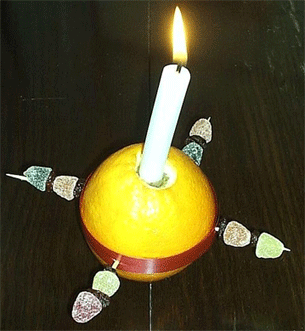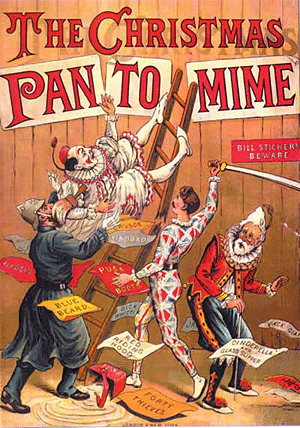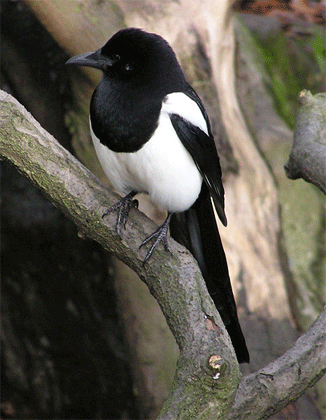A while ago, we asked about gift giving traditions around the world. Nicola Holdsworth wrote to us from the UK telling us about British holiday and gift-giving traditions. Here’s what she wrote…
We give horseshoes for marriage, oranges form part of the Christingle celebration, usually with candles and ribbon. 21st birthdays are sometimes symbolized with the giving of a decorative key.
I asked Nicola about Christingle, because we don’t celebrate it here in the States. She wrote:
It’s part of the pre-Christmas celebrations. It’s mainly for school children, it’s usually an orange with a ribbon wrapped round the circumference, a candle stuck in the top and cinnamon seeds stuck into the orange round the outsides.
Here is a photo I found of a Christingle:

Nicole wrote about Easter traditions in the UK:
We also give Easter eggs. The Easter eggs are usually chocolate and vary in size, incidentally my boyfriend works at Nestle which is one of the companies that make them. We also do Easter egg hunts with mini eggs usually for younger children.
Nicole wrote about the anniversary traditions in the UK:
Each annual wedding anniversary has a different meaning and item attached to it i.e. 1st is paper etc.
Our anniversaries over here, they all have “names” and for each, a gift is given which relates to the “name”:
1 paper
2 cotton
3 leather
4 linen
5 wood
6 iron
7 copper
8 bronze
9 pottery
10 aluminum
11 steel
12 silk
13 lace
14 ivory
15 crystal
20 china
25 silver
30 pearl
35 coral
40 ruby
45 sapphire
50 gold
55 emerald
60 diamond
Nicola wrote:
A few other traditions for you, there’s some English superstitions in there too, so your going to have to sift through cos I’ve included quite a lot!
Maypole Dancing- usually done in spring, it’s quite an old one which involves a tall pole and lots of long ribbons in various bright colours.
Scarecrow Festivals- done in autumn local groups i.e. schools and scouts build and decorate a scarecrow, they are then collected and arranged in fields round a path, people then pay for a map and walk round answering questions about each scarecrow i.e. what colour hat are they wearing or which road are they on, the money is then given to charity.
Bonfire Night – fire works and sparklers and hotdogs etc, also called Guy Fawkes night after he tried to blow up the houses of Parliament in London.
British Saints all have their own day:
St. David – Wales – March 1
St. Patrick – Ireland – March 17
St. George – England – April 23
St. Andrew – Scotland – November 30
I asked about St. George’s Day, and Nicola wrote:
St George’s Day is all based around St. George slaying a dragon, from what I can remember it’s a tale that said a village was living in fear of a dragon and young girls were being sacrificed to stop the dragon from eating the livestock. Then a prince came along, slayed the dragon and rescued the latest sacrifice who was the village leader’s daughter. So now around the time there is a parade usually organized by the scout movement, sometimes with floats and brass bands.
Nicola continued telling me about British traditions:
Remembrance Day – November 11th – in remembrance of soldiers killed in World War 1
Queens Birthday – London parade
Queen’s speech – Xmas day
Pantomimes around Xmas, all during November and December – local theatres put on pantomimes, usually with a man dressed as a comedy madam, a pretty damsel in distress and a dashing prince, lots of audience involvement and slapstick comedy. Aladin is one of the main panto’s that’s done along with Jack and the Beanstalk, Snow White and Peter Pan. Here’s the link to the wikipedia page on Xmas Pantomime.
Here’s an old poster for a Christmas Pantomime:

I asked Nicola if she goes to the pantomimes or if it’s for kids and she said, “I go to at least one every year, I’m a cub scout leader so I take the kids to the local one.”
Here are more traditions Nicola wrote about:
Pancake Day – Shrove Tuesday – around Jesus’ resurrection (people eat pancakes before fasting for Lent).
1st Footing in Scotland – Putting coal on your house threshold on New Years Day – to do with good luck and to welcome in the new year, they put the coal on the outside doorstep.
Having a chimney sweep at your wedding is good luck i.e. to bless it I think, is supposed to bring good luck for the newly married couple.
[UPDATE: I talk more about the Chimney Sweep Tradition here.]
Weddings – bride should wear something old, new, borrowed, and blue – it should be one of each, but two or more can be combined.
Picking up a penny is said to bring good luck.
Giving a wooden spoon for baking for a bride.
Don’t walk under a ladder, brings bad luck.
Bride throws bouquet at a wedding, the person who catches it is supposed to get married next.
Breaking a mirror is supposed to bring you 7 years bad luck unless you throw a pinch of salt over your shoulder.
Walking on cracks on the pavement brings bad luck.
Black cat crosses path good luck. (Note by Mama Lisa: in the US, crossing the path of a black cat is considered bad luck!)
Magpies: 1 for sorrow, 2 for joy, 3 for a girl, 4 for a boy, 5 for silver, 6 for gold, 7 for a secret never to be told.
“Magpies” is an old superstition that school children learn, its supposed to be linked to how many you see is what you’ll get and if you only see one your supposed to cross yourself (finger tracing the shape of a cross on your face cheek to cheek then forehead to chin) to get rid of the bad luck.
Here’s a photo of a magpie:
Opening a umbrella inside is supposed to bring bad luck.
Shoes on a table brings bad luck.
Nicola said, “I didn’t think of all of these, I rang my mum and grandma for some more!”
I asked Nicola if most of these are still followed or not? She said, “A lot of them are known but not really followed, it’s mostly the older generations that still follow them.” I believe she meant that British people still follow many of the traditions (like Guy Fawkes Day and Christingle), but not the superstitions as much.
I would like to thank Nicola Holdsworth, and her Mum and Grandma, Susan Holdsworth and Gillian Hamer, for sharing these British traditions with us!
Thanks so much!
If you would like to share your traditions with us, please feel free to comment below or email me at lisa@mamalisa.com .
Mama Lisa
UPDATE: Check out info about some traditions and superstitions in the US and France in the comments below…
This article was posted on Thursday, February 11th, 2010 at 7:48 pm and is filed under Anniversary Gifts, Bonfire Night, Christingle, Christmas, Countries & Cultures, Customs and Traditions, Easter, Easter Eggs, England, English, First Footing, Folk Lore, Gift Giving, Gift Ideas, Guy Fawkes Night, Holidays Around the World, Ireland, Languages, Mama Lisa, May Day, Maypole Dancing, New Years, Pancake Day, Recommendations, Scotland, Shrove Tuesday, St. Andrew's Day, St. David's Day, St. George's Day, St. Patrick's Day, Superstitions, United Kingdom, Wales, Wedding Anniversaries, Wedding Gifts, Weddings, Weddings. You can follow any responses to this entry through the RSS 2.0 feed. You can skip to the end and leave a response. Pinging is currently not allowed.


























February 12th, 2010 at 3:16 pm
[…] Turnbull from Musicaliti saw my post about British traditions and wrote to me about an interesting African one. Here’s what she said: Thanks for this […]
February 12th, 2010 at 9:28 pm
[…] Check out a later post about Holiday Traditions, Gift Giving and Superstitions in the UK. Share on Facebook and other […]
February 26th, 2010 at 12:26 pm
Yes, everyone knows about these traditions (which by the way I found on a search for UK holidays… as in breaks, hotels etc) but we don’t always pay attention to them. The black cat one goes both ways, as if it crosses your path from one way it is bad luck, the other means good luck. Also, most people love pantomimes in the UK as they are always based around all kinds of fairytales, but with lots of adult jokes thrown in…. and the 1st footing is an English thing too, but not many people practice it now- in England the person with the darkest hair (in the house at the time) has to leave by the back door and wait outside the front to be let in at exactly midnight. They are meant to hold coal and a loaf of bread. What are the equivalent of all these holidays in the US?
Kez
February 26th, 2010 at 12:46 pm
I wonder what else is not followed in the UK any more?
In the US, we don’t have Christingle, Pantomimes, Guy Fawkes, May-pole Day or Pancake Day. We don’t have Saints Days (very religious people may go to church for them though). Our Remembrance Day is Veterans Day on November 11th – which honors all military veterans. We also have Memorial Day (the last Monday in May) in memory of all fallen soldiers.
We have a different list of Anniversary Gifts (some are the same as the British ones).
We dye Easter Eggs. Children who celebrate Easter get baskets filled with jelly beans, little chocolate eggs and one larger chocolate Easter Bunny or Egg. We have Easter egg hunts in our houses and as public events (in schools etc.).
For us in the US, passing a black cat is bad luck, as is breaking a mirror (7 years of bad luck – I never heard of a way to get rid of it). Walking under ladders is bad luck here too. The number 13 is bad! So is 666! I don’t think we have magpies here. When I was a kid we believed these superstitions – at least the kids did (I think some adults did and still do).
Kids say, “Step on a crack, break your mother’s back.” So you didn’t want to step on a crack.
Picking up a penny is good luck here too.
We have the same wedding traditions – something borrowed, something new, etc., also about throwing the bouquet. I had never heard of the one about chimney sweeps though.
Feel free to ask specific questions if you have any!
I’m curious if there are any specific foods you still eat for the New Year? (They eat lentils in France and Italy.)
Mama Lisa
February 27th, 2010 at 11:24 am
Lisa asked, “What about France”? so here we go…
We do have superstitions:
Bringing bad luck: black cat crossing the street, walking under a ladder, to be 13 people around the table for a meal , breaking mirrors, opening an umbrella inside the house, getting married in May (“Mary’s month”), wearing green or having green color in a theater set, saying the word “rope” on a boat/ship,
Bringing good luck: having a horse shoe, finding a 4-leaf clover, being given a prig of lily of the valley on May 1st, seeing a shooting star (your wishes are supposed to come true), throwing coins in a fountain,
Bad/ good luck (either): #13, Friday 13th -lots of people buy lottery tickets, the top of the top being to buy a lottery ticket on Friday 13th at 13:13 (1:13pm)…
No, we don’t have Christingle or pantomime like they have in England and some other places for Christmas and New Year. That would be more our Judgement of Mister Carnival.
What we have is: galette for Epiphany, crêpes on Candlemas, gifts exchange between spouses, lovers, fiancés… on Valentine Day -no card, Carnivals, April’s “fish”, Easter eggs, having sweet omelette and/or a picnic on Easter Monday, lily of the valley on May 1st, bonfires on St John’s day (June 24th), bringing flowers to our Dead on Nov. 1st, gifts exchange for Christmas. Then we have local special celebrations -such as special Carnival celebrations.
February 27th, 2010 at 12:07 pm
Thanks Monique! That’s interesting. In the US, Friday the 13th is considered to be bad luck, as is opening an umbrella inside a house.
Horse shoes and finding a 4-leaf clover are good luck here too, as are rabbits’ feet. We also make wishes when we see a shooting star and when we throw coins in a fountain.
November 9th, 2010 at 12:37 pm
Hello! This *is* fascinating reading, although I’d never heard of scarecrow festivals, and would put the Christingle as quite a Christian celebration – I only know of it in the context of church and the christingle song, sung to the tune of “the holly and the ivy”. I always thought first footing was more of a Scottish thing, but then in Scotland Hogmanay (New Year) is traditionally an even bigger celebration than Christmas, often going on until the night of Jan 2nd (also a public holiday here in Scotland). Staying in Scotland, Burn’s night on 25th is also celebrated by many, to celbrate the Scottish poet Robert (“Rabbie”) Burns. Restraunts and pubs will (if they don’t already) serve up a traditional “Burns Supper” of haggis, neeps (mashed turnips) and tatties (mashed potato). It is accompanied by a dram (small measure) of neat whiskey. Done properly, the Selkirk Grace is recited beforehand, and the haggis is carried into the room to the accompaniment of the bagpipes. Then, the most crucial part, “address to the haggis” happens. This is literally a recitation of Burns’ 8 verse poem about the wonder of haggis *to* the haggis, and culminates with it’s consumption by everyone in the room. throughout the meal there will be formal toasts and speeches, including the “Toast to the lassies” and “Toast to the laddies”, both of which should be playfull observations of one sex on the other.
The full details are on wikipedia, but I’ve copied the first verse of the poem here:
*****************
Fair fa’ your honest, sonsie face, (sonsie = cheerful)
Great chieftain o’ the puddin-race! Great chieftan of the offal dishes
Aboon them a’ ye tak your place, Above them all you take your place
Painch, tripe, or thairm: (Whether they be) Stomach, tripe or intestine:
Weel are ye wordy o’ a grace Well are you worthy of a blessing
As lang’s my arm. As long as my arm
*******************
loving the blog btw! particularly the crafty stuff which is how I found it – thanks for inviting me to comment. And I grew up in the north of england in a seaside town, and then in the far north of Scotland :)
November 9th, 2010 at 11:13 pm
Thanks so much for sharing that! I’ll make it a full blog post one day. If you ever want to share any other traditions, songs, or even recipes any time… just let us know.
More crafts coming soon!
Lisa
August 13th, 2011 at 11:49 pm
Dave wrote (August 13th, 2011):
The First Foot is NOT coal at the door stop….The First foot at new year/ Hogmanay is the FIRST FOOT to cross the door step into the house after the stroke of twelve January 01 The darker the first foot the better. No blonds if you please until we have a dark one in the house. We were lucky to have the Black Scots, the decendents of the Spanish sailors rescued from the ships of the Armada. Now comes the coal, you wer’na far off…. The first foot brings a lump of coal, a loaf of bread, and a dramachie… a bottle of whisky. Where I am from we favour the Ish-kah-va {phonetic} (water of life) whisky made close to home and without the King’s tax label. Newyear Hogmanay usually lasts about a week. It has been said the only difference between a Gaelic funeral and a Gaelic wedding is one less drunk.
{Gaelic} Mar sin leibh an drasa (Eng: tata for now)